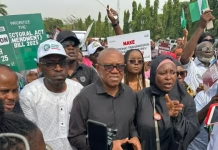PricewaterhouseCoopers, PWC, has advised the Nigerian government to resolve challenges affecting access to foreign exchange and irregular power supply in order to grow the economy.
The Chief Economist of PwC Nigeria, Andrew Nevin, said the ability of the government to address the aforementioned challenges and complete end the fuel subsidy will enable the economy to grow by seven percent.
He spoke at PwC’s virtual executive roundtable on the Finance Act 2020 and Economic Outlook for 2021 held on Monday February 1, 2021.
Nevin stressed that Nigeria’s economy had been distorted by the exchange rate fuel subsidy regime and the power sector.
“Addressing these three big distortions will be taking the giant step to restructure the country’s economy holistically; achieve the seven percent GDP growth, and improve the lives of the average Nigerian,” he added.
He highlighted nine other themes that policymakers and businesses needed to consider and prioritise in 2021 in order for Nigeria to find its development path.
READ ALSO: Shortage Of FX, Naira Depreciation Manufacturers’ Nightmare
According to him, Nigeria holds as much as $900 billion worth of dead capital in residential real estate and agricultural land.
He said, “The value of the Federal Government’s abandoned properties alone, according to the Nigerian Institute of Builders, is projected to be about N230 billion. And about a half of Nigeria’s population live in cities, of which almost 80 per cent of them are living in substandard conditions.
“Finding the political will to act and unlock Nigeria’s dead real estate assets will have a transformative impact on the lives of Nigerians.”
In his welcome remarks, the Country Senior Partner at PwC Nigeria, Uyi Akpata, noted that considering the impact the pandemic was having on Nigeria’s economy, it was important for businesses to understand the forces shaping Nigeria’s economy in 2021.
According to him, this knowledge will help them minimise potential risks and take advantage of the fiscal policies the government has enacted to stimulate the recovery of the Nigerian economy.
While delivering the keynote address on the economy and government’s policies towards the recovery, the Minister of Finance, Budget and National Planning, Mrs. Zainab Ahmed, emphasised the administration was committed to enabling economic recovery and stimulating inclusive growth through policies and interventions designed to foster economic resilience and business sustainability.
READ ALSO: Seplat Raises $260m Debt Facility For Gas Processing Project
She noted that the Finance Act 2020 aimed to support vulnerable households and businesses while improving fiscal discipline and procurement efficiency, enhancing economic competitiveness, encouraging domestic investors and enhancing macroeconomic stability amid the challenges posed by the COVID-19 pandemic.
The Fiscal Policy Partner and West Africa Tax Leader at PwC Nigeria, Taiwo Oyedele, shared insights on how the Finance Act 2020, and other significant changes that had been made to existing laws.
While commending the government for the reduction in minimum tax rate, he advocated for a permanent removal of the tax which often tax companies that are vulnerable especially when they are loss making.












